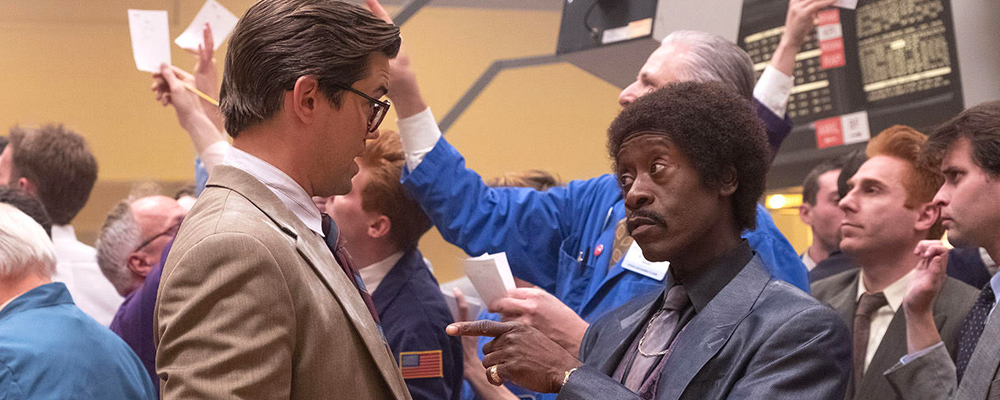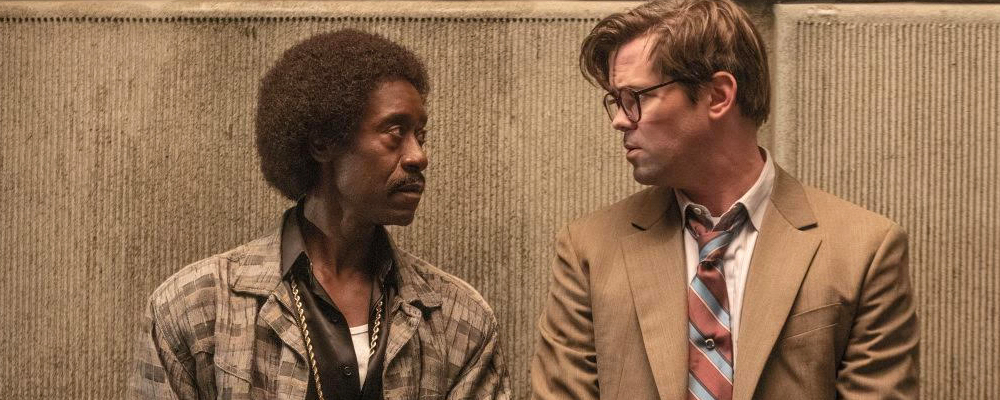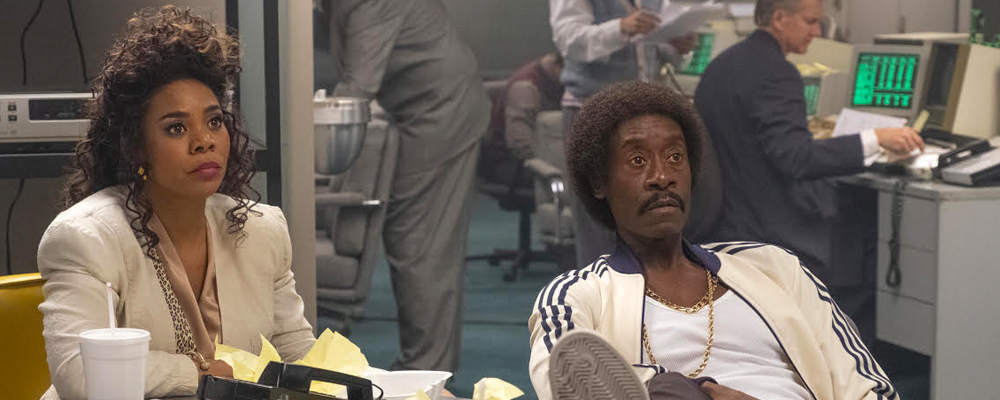‘Black Monday’ Mocks the Wall Street Excesses That Led to 1987 Crash
Alci Rengifo
Showtime’s “Black Monday” opens with an image that is immediate and direct. A man in an expensive suit decides to end it all and comes crashing down on a parked Lamborghini. It is Wall Street in 1987. Produced by Seth Rogen, this rowdy show will spend its time tracking the days until the market crash of October 19 of that year, when a big crack appeared on the Reagan era’s image of prosperity. Stylistically it is a high octane nostalgia trip, packed with a stellar ensemble cast. There’s so much actually, that sometimes the cocaine-fueled energy and jokes threaten to bury the story.
Don Cheadle plays Maurice “Mo” Monroe, a cutthroat trader on Wall Street who has two passions in life: Money and cocaine. His office is an assortment of fellow hard ballers (or wannabes anyway) like Keith (Paul Scheer), Ronnie (Eugene Cordero) and Yassir (Yassir Lester). Looking for a promotion is Mo’s last real flame, Dawn Darcy (Regina Hall), who is now seriously involved with a brain surgeon. Into the office comes a true innocent, Blair Pfaff (Andrew Rannells), who is desperate to make real money. Blair is engaged to Tiff (Casey Wilson), who comes from a wealthy family and constantly pushes Blair to move up in the world (especially so she can have a trash compactor). But when he tries to join Mo’s crew he does himself little favors by losing money with an algorithm he hoped would speed up earnings. He’s not into “tooting” at first, meaning snorting coke, or hookers, but he does have something Mo wants, namely Tiff’s shares in a clothing company Mo desperately wants to acquire. In fact, Mo has been scheming all along to get close to Blair, win his trust and get those shares once the computer nerd ties the knot.
If there is one thing “Black Monday” lacks it is boredom. The energy all rests on the performances and colorful characters. This is surely one of the season’s most brutal shows when it comes to the level of humor. Because it is set in the 1980s in a pre-safe space, pre-Gillette toxic masculinity ads world, the writing shamelessly throws around sexist banter, Holocaust jokes and homophobia. Like “The Wolf of Wall Street” it presents the stock exchange as a savage terrain where lacking thick skin is a death sentence. Blair is mocked for having a “girl’s name” and prostitutes are allowed in the back rooms. Mo basks in flashiness, showing off his habit for drugs and women, mocking the Lehman brothers, Lenny and Larry (Ken Marino), to their faces. Cheadle carries nearly the entire show on sheer personality, which fills in the gaps where there doesn’t seem to be much story. In the first three episodes it still isn’t clear precisely how all of this leads to the 1987 crash. Generally what comes across as is that people like Mo played with the economy like a casino, betting and borrowing, engaging in insider trading and other forms of manipulation. When Blair looks aghast at a fellow trader, Ty (Kurt Braunholer) for partaking in under the table activities he’s simply mocked as a naïve fool. Moments like this are all done with satirical exaggeration in the acting and even camera work. At times “Black Monday” verges on outright sitcom, which isn’t necessarily a bad thing when it satirizes the crooked ways of Wall Street. But there isn’t room for much dramatic tension or proper formation for the characters, they become walking punchlines. Instead of truly taking apart the idea of the market and how it works, we get one too many shots of Cheadle, and soon Blair snorting coke off mirrors and Nintendo controllers.
The side plots verge from feeling like extra weight to generating real interest. Keith is married but carries on a secret gay love affair, making eternal promises to his lover while trying to please the wife. The heart of Mo’s own storyline is his lingering love for Dawn, who he makes partner to keep her onboard for his scheme involving Blair. It is the moments between Mo and Dawn that have the best drama in the whole show, with flickers of what could be. Hopefully as the show progresses it will develop this relationship more, lest it get buried under sensational debauchery like HBO’s ill-fated “Vinyl.”
Above all else “Black Monday” is really about being hyper nostalgic. It endlessly references the decade, from the music to the gadgets that were in vogue. The soundtrack is wall to wall with hits by artists like Tears for Fears. A writer developing “Oliver Stone’s untitled Wall Street project” follows Mo around to take notes, Dawn mocks “Top Gun” as a veiled gay movie. Mo himself makes the claim that Al Pacino’s performance in “Scarface” lacks authenticity. When it all works it’s fun, but sometimes the writing tries too hard, as if Rogen and the showrunners want to pound it into our heads that “this is the 1980s.” It’s doubtful people in any era sound as meta as the characters in this show.
Yet there is a promise of glory in “Black Monday,” which might become more clear once the plot nears the eventual crash and we get the full story of the body crashing into the Lambo. For now it’s at least great fun to watch Don Cheadle doing lines and talking business, and maybe that’s the point, that in the end the market is made by egos and chaos.
“Black Monday” season one premieres Jan. 20 and airs Sundays at 10 p.m. ET on Showtime.



